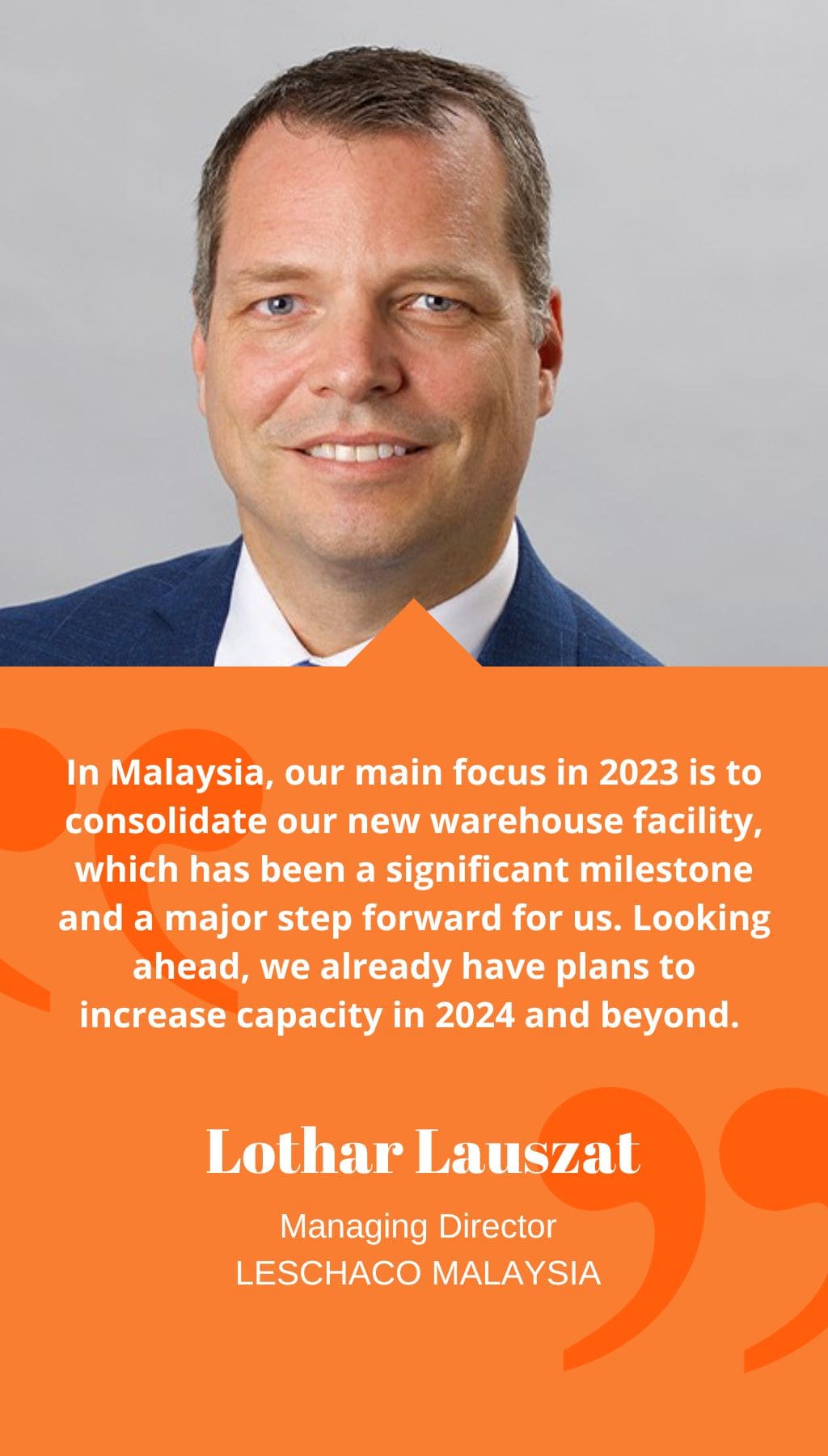
- Malaysia | 29 March 2023

Can you provide an introduction to Leschaco Malaysia?
Leschaco Malaysia is part of Leschaco, a medium-sized multinational corporation with over 3,000 employees worldwide. In Malaysia, we have been operating since 2000, initially managing our business from Singapore for the first 10 years. However, starting from 2010, Leschaco Malaysia embarked on an ambitious development plan, aligning our growth with the chemical and oil & gas industries in the country. One of our key strengths is our network of 100% owned companies, all sharing the same operating systems and platforms. This allows us to operate efficiently, especially in terms of shipment visibility. We have the ability to monitor and document the entire transportation chain, from door to door.
What are the main services offered by Leschaco Malaysia?
Leschaco Malaysia offers a comprehensive range of logistics services. We provide sea freight container shipping services, both Full Container Load (FCL) and Less than Container Load (LCL). Additionally, we offer airfreight services and are registered as an IATA cargo agent. We also operate an ISO tank container fleet of approximately 6,000 tanks, which is a unique service in the industry. A crucial aspect for the chemicals industry is our brand-new warehouse for chemicals and dangerous goods (DGs), where we offer contract logistics services, including warehousing and distribution. In terms of warehousing, we primarily handle imported finished products that are then distributed to end customers. We also provide customs clearance and inbound-outbound handling services, as we are a registered customs broker in Malaysia.
What has motivated Leschaco’s investments in warehousing expansions in Malaysia over the years?
We identified a strong demand for chemical storage facilities that meet the highest Environmental, Health, and Safety (EHS) standards for various types of hazardous materials, including flammable, toxic, and corrosive products. In response to this demand, we started looking into capacity expansions. In 2019, we began construction on our current facility, which was inaugurated in 2021. With a total area of 128,000 square feet, the warehouse has three times the capacity of our previous facilities, allowing us to consolidate our existing warehouse businesses into this new location. This warehouse was specifically designed for chemicals and DGs, taking into account factors such as heat resistance of the walls and containment installations to prevent spillage.
What have been the recent trends in shipping volumes in and out of Malaysia?
In terms of volumes, 2022 was a relatively stable year with limited fluctuations. However, the biggest challenge came from the volatility in freight prices. For example, in the transpacific trade, freight rates from Southeast Asia to the US soared to $15,000-$20,000. By the third quarter of 2022, prices dropped to pre-Covid levels. Overall, sea freight rates on some trade lanes have returned to similar levels as before the pandemic, considering factors such as the impact of the IMO 2020 regulations and fuel prices. At Leschaco, we recognize the volatile, uncertain, chaotic, and ambiguous nature of the shipping industry. We anticipate that shipping volumes may decline in 2023 due to various global uncertainties such as the conflict in Ukraine, inflation, lower private consumption, reduced public spending, and other macro trends. However, Leschaco is well-positioned to continue growing even in this challenging environment.
What are Leschaco’s main investment priorities for 2023 and beyond?
In Malaysia, our main focus in 2023 is to consolidate our new warehouse facility, which has been a significant milestone and a major step forward for us. Looking ahead, we already have plans to increase capacity in 2024 and beyond. Additionally, we are focused on expanding our footprint in Johor, where we currently have a sales office. Human resource development is another top priority for us, as we aim to provide our existing employees with the best career opportunities and successfully onboard new recruits. Towards the end of last year, Leschaco launched a new Enterprise Resource Planning (ERP) system, which will be implemented across our business units over the next two years. This software change will bring about organizational and cultural changes that we need to adapt to, as part of a broader reorganization effort that includes the implementation of regional and product management structures.














